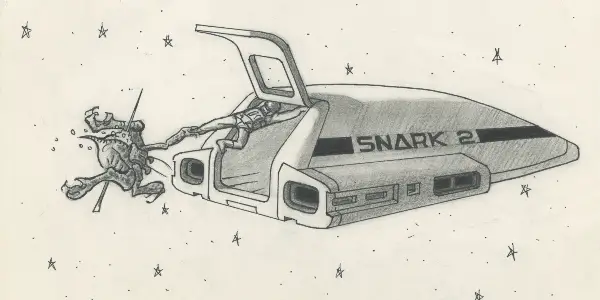MEMORY: THE ORIGINS OF ALIEN: A Cerebral Look Into The Depths Of A Classic

Lee Jutton has directed short films starring a killer toaster,…
Think you know everything about your favorite movie? Filmmaker Alexandre O. Philippe specializes in proving otherwise. From The People vs. George Lucas, which examined fan disenchantment with the Star Wars creator, to Doc of the Dead, which went deep into our collective obsession with zombies, to 78/52: Hitchc*ck’s Shower Scene, a feature-length dissection of one of cinema’s most famous murders, Philippe has created an unusual niche for himself: documentaries that explore everything there is to know about important pieces of pop culture.
His latest, Memory: The Origins of Alien, is not the first documentary to be made about the 1979 science-fiction and horror classic. But, it offers its fair share of intriguing insights into the film’s inspirations in art and mythology to still be a worthwhile watch.
Back to the Beginning
Where does the idea for a film originate? In most cases, it is in the writing of the screenplay, and in Memory: The Origins of Alien, that is where we begin. Diane O’Bannon, the widow of Alien screenwriter Dan O’Bannon, describes how her husband – a lifelong science-fiction and horror enthusiast – became involved in the world of film production, including collaborating with John Carpenter on the student film-turned-feature Dark Star and working as a computer animator on Star Wars. Turning away from technical work, O’Bannon decided to fully devote his energies to screenwriting and shacked up with his friend Ronald Shusett to workshop the story that eventually became the screenplay for Alien.

But as we know all too well, a screenwriter’s vision can only come to life if they find the right collaborators. For O’Bannon, those were director Ridley Scott and artist H.R. Giger. Scott, who had not previously worked in genre film, ensured that the film didn’t fall into any of the traps and cliches to which other science-fiction films too often succumbed. In particular, his use of handheld camerawork – always moving, but never shaky or distracting – amped up the film’s sense of terrified anticipation. Meanwhile, O’Bannon was able to convince Scott and others that the deliciously creepy work of the Swiss artist Giger was the perfect aesthetic inspiration for the titular villain, the result being one of the most iconic monsters in movie history.
A Deep Dive Into Some Dark Minds
Much of the focus of Memory: The Origins of Alien is on how these three brilliant minds – O’Bannon, Scott and Giger – combined in an almost symbiotic manner to create a classic; without just one of them, there is no doubt that Alien would not have been nearly as memorable. (“Teamwork makes the dream work” might be the corniest saying of all time, but when it comes to the art of filmmaking, it’s actually pretty legit.) Yet also of key importance in this film is what inspired these three men to make the artistic decisions that they did, with influences ranging from the morbid artwork of British artist Francis Bacon to the story of the Furies from Greek mythology. It’s worth noting that the latter are brought to life in the documentary through some bizarre staged sequences, including the film’s opening, that feel wholly out of place with the rest of the relatively straightforward movie.
Memory: The Origins of Alien mixes clips from movies before and after Alien hit the screen, archival footage from the set as well as interviews with the now-deceased O’Bannon and Geiger, and input from cast and crew to create an intensely detailed portrait of how a cavalcade of influences helped bring a game-changing piece of cinema to our screens. Needless to say, after watching this documentary, you’ll never look at that iconic chest-bursting sequence the same way ever again. Whether you want or need that much information on the inspirations for Alien, however, is a personal preference wholly dependent on how much you love the movie and how much you enjoy peeking behind the curtain to see how movie magic is made. For some, it may remove some of the mystique, but it is guaranteed to leave others spellbound.

Conclusion
Depending on how interested you are in the movie Alien and the art of filmmaking, it could be easy to find Memory: The Origins of Alien overly dry. Comprised as it is primarily of archival footage and talking heads collectively geeking out, it isn’t going to change the documentary game the way its subject changed horror and science-fiction. But if you’re a big fan of any of the topics covered, enough treasures are unearthed by Philippe and company for you to stay engaged.
What do you think? Does Memory: The Origins of Alien sound like it provides enough fresh material on the making of this classic movie to be a valuable film itself? Share your thoughts in the comments below.
Watch Memory: The Origins of Alien
Does content like this matter to you?
Become a Member and support film journalism. Unlock access to all of Film Inquiry`s great articles. Join a community of like-minded readers who are passionate about cinema - get access to our private members Network, give back to independent filmmakers, and more.
Lee Jutton has directed short films starring a killer toaster, a killer Christmas tree, and a not-killer leopard. Her writing has appeared in publications such as Film School Rejects, Bitch: A Feminist Response to Pop Culture, Bitch Flicks, TV Fanatic, and Just Press Play. When not watching, making, or writing about films, she can usually be found on Twitter obsessing over soccer, BTS, and her cat.











